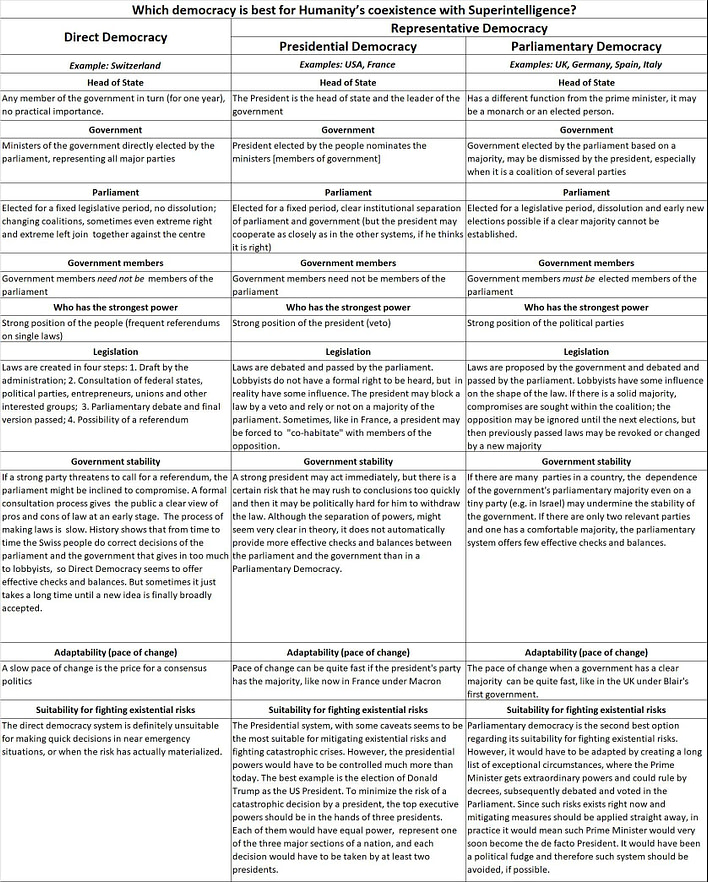This is an extract from the book by Tony Czarnecki: Who Could Save Humanity from Superintelligence?. It covers a new system of democracy called Consensual Presidential Democracy, as one of the key measures to minimize existential risks facing Humanity. It is put in the context of the future European Federation, but it is set up in such a way that it could be adapted by any organization or a country. This extract does not provide any justification for the setup of the new democracy – they are fully discussed in the book. Please leave any comment at the bottom of this page.
I have identified in the book some key problems of the democratic system and potential solutions that could improve democracy. I would now like to use the conclusions from that analysis to look for a new democratic system, which would support the purpose and main objectives of the European Federation, which go beyond the transition period, i.e. until at least 2040.
The world needs a powerful World Government but there is no way, that such an institution can be created quickly. Therefore, the future European Federation is proposed to take a de facto role of such an institution, which would include most, but not all countries, e.g. Russia or China. Which democratic system could take into account the problems Humanity is facing right now and, equally importantly, in the near future? From the review of the existing democratic systems, it is obvious that there is no democracy, which would support the purpose and the main objectives of guiding Humanity safely through the period of extreme risks. Therefore, what is proposed here is a new type of democracy, called Consensual Presidential Democracy, which will be able to fulfil the following criteria:
- To facilitate the federalization process of the EU, as the best currently available organisation that could act as a de facto World Government
- To apply only a very shallow level of federalisation, so that it will centralize only the very essential powers, leaving the rest of decisions making at the lowest possible level of governance
- To significantly reshape the relationships between the governed and the governing instilling more trust through a greater transparency and continual accountability
- To protect Humanity from existential risks that may emerge from global political, social and economic disorder through combinatorial effects
- To protect Humanity from other existential risks, especially coming from Superintelligence
- To prepare Humanity for the time when we will coexist with Superintelligence, which potentially could start the best period in human history (if we mitigate the risks successfully)
- To prepare Humanity for even more challenging task – a gradual merging of our species with Superintelligence.
Such a new style of democracy may have a better chance of supporting the new European Federation and indeed any other organization, or a state, that would take on the role of the World Government and withstand even more severe challenges than those to which the EU may be exposed in the near future. So, which democratic system could take all this into account, and which one will help us most to resolve the problems we are facing right now and, equally importantly, in the near future? An organization called “Democracy building” (Democracy_building, 2004) has quite succinctly summarized the basic functions of democratic systems, which I have adapted and appraised for their suitability of reducing existential risks and for becoming a foundation for the Constitution of the European Federation.

The conclusion, which clearly comes out of this table and the previous analysis is that there are some significant formal and institutional differences between Direct, Presidential and Parliamentary Democracy offering some choice. However, when you look at the requirements list above, it is obvious that none of these systems is good enough on its own for our needs. Let me give you some examples:
- There is no democratic system in the world that would guarantee in its constitution self-determination of a region leading to setting up a separate state (the best recent example is the case of Catalonia and may be soon – Scotland). Even if such articles exist they always have a caveat that the region must first seek the consent of the state from which it wants to separate.
- There is no system of government in any democracy that would envisage a strong separation of legislative and executive powers by forbidding most of the MPs to sit in the government (apart from some key posts such as the Prime Minister, Finance Minister, Defence and Home Office ministers).
- There is no democracy system whose constitution would facilitate governmental powers enabling it to act effectively in fighting existential risks that face us all, i.e. the entire Humanity. That is of course logical, since only the government acting on behalf of the whole Humanity would need such a prerogative. Since I have suggested the EF as the organization, which has the greatest potential to take up such a role of the World Government, it must have such provisions in its constitution.
So, the conclusion is that there is no single democratic system that would fulfil our requirements, nor any silver bullet solution that we could apply for our needs. Therefore, I propose an amalgamation of several features present in various democratic systems and adding some new ones, creating in effect a new type of democracy, which I propose to call Consensual Presidential Democracy.

Comments